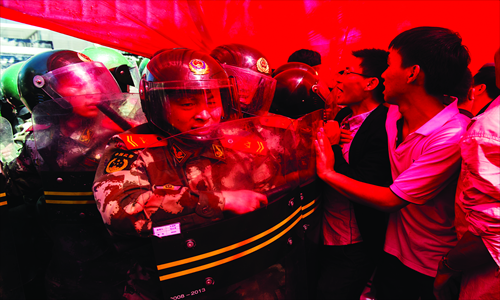M WAQAR..... "A man's ethical behavior should be based effectually on sympathy, education, and social ties; no religious basis is necessary.Man would indeed be in a poor way if he had to be restrained by fear of punishment and hope of reward after death." --Albert Einstein !!! NEWS,ARTICLES,EDITORIALS,MUSIC... Ze chi pe mayeen yum da agha pukhtunistan de.....(Liberal,Progressive,Secular World.)''Secularism is not against religion; it is the message of humanity.'' تل ده وی پثتونستآن
Sunday, September 16, 2012
China: 80,000 march against Japan
A growing number of Chinese citizens participated in demonstrations against the Japanese government's illegal purchase of China's Diaoyu Islands at the weekend. However, a series of violent activities that erupted across Chinese cities on Saturday cast a shadow over proceedings.
A total of 80,000 people were involved in Saturday's protest, which continued Sunday in at least 85 cities, such as Beijing, Shanghai, Shenzhen and Chengdu, according to the Kyodo News Agency.
The Japanese government estimated that the demonstrations were the largest seen since the normalization of the Sino-Japanese relationship in 1972.
"I hope the Japanese government will feel awed when seeing so many Chinese people united together, protesting against them," Liu Yan, a designer who joined the protests in front of the Japanese embassy in Beijing, told the Global Times.
Hundreds of Beijing policemen, SWAT teams, and volunteers maintained order on both sides of the road. As police helicopters hovered overhead, below them thousands of protestors chanted "the Diaoyu Islands belong to China" and "Protect our territory," with some throwing bottles at the embassy.
Dong Ya-sheng, a policeman dispatched from eastern Beijing's Tongzhou District to the embassy Sunday morning together with 250 colleagues, told the Global Times that nearly 10,000 people had joined in protests near the embassy Sunday but that "no very violent moves" had been seen so far.
Thousands of people joined in the protests in Shanghai Sunday, which were kept under strict control by hundreds of the local policemen. Protesters were allowed to stay for no longer than 10 minutes in front of the Shanghai consulate.
However, the protests did turn violent in some major Chinese cities such as Xi'an, Dongguan, Changsha and Qingdao, according to media reports.
About 200 Japanese cars were overthrown or smashed in Xi'an Saturday, and nearly 80 percent of the local department stores were closed to avoid the protests. The glasses and the door of a local hotel were smashed Saturday because people heard a Japanese delegation was having a meeting inside the hotel.
A wave of anger was evoked among the public in the wake of more violent protests revealed online, and many accused some protesters of being gangsters and mobs using the cover of patriotism.
"Such radical behavior will only bring economic losses to China and harm its image," said Yang Bojiang, a researcher on Japanese studies with the China Institutes of Contemporary International Relations.
Yang called on the public to protest in a civilized and proper way, so that the protests could not only inform Japan of the Chinese people's firm determination to protect their territory, but also provide strong support to the Chinese government.
The national taskforce cracking down on gangs warned the public Sunday through its Sina Weibo that people taking illegal actions, under the misapprehension that they were legal or that the government would sanction such moves, would be prosecuted.
Liu Jiangyong, a professor of Japanese studies with Tsinghua University, said that the patriotic feelings of Chinese people may have been taken advantage of by those who aim to harm social order and damage China's economy.
"It might also provide an opportunity for some Japanese politicians to attack and vilify China," he added.
However, a few people's unreasonable and extreme violent behaviors do not represent the attitude of the majority of the Chinese people, Yang said.
"Most are taking part in the protests out of their sincere patriotic feelings, which should not be downplayed or vilified." Yang said.
Subscribe to:
Post Comments (Atom)


No comments:
Post a Comment